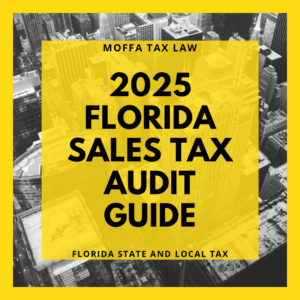

The Florida Department of Revenue is responsible for administering a variety of state taxes, such as sales tax and corporate income tax. Although the number of Florida corporate income tax audits is growing, the Department of Revenue most heavily audits businesses for sales and use tax compliance. In fact, Florida so heavily emphasizes sales and use tax in its audits that it has expanded its focus in the last year to increase sales tax audits of individuals as well. Unfortunately, Florida’s state and local taxes are technical and unintuitive. Taxpayers both in and outside of Florida are generally unprepared when they receive a DR-840 Notice of Intent to Audit Books and Records.
Although Florida sales tax audits may appear to be the same at first glance, there are in fact a wide variety of them. It is vital to identify the nature of a Florida sales tax audit as early in the process as possible. Florida sales tax audits include:
- Florida Business Sales Tax Audit
A traditional audit from the Florida Department of Revenue begins with a DR-840 Notice of Intent to Audit Books and Records and looks for a broad scope of information and documentation. It is important to understand that the initial records request is almost always a standard form and so may not be applicable to your business or may request records not applicable to your audit. Before providing records with no context and potentially no relevancy, taxpayers may want to speak to the sales tax auditor and understand what they are looking for. Some auditors only look for sales tax issues. However, the majority of Florida tax auditors are looking for both sales and use taxes. - Florida Limited Scope Audit
A Florida Limited Scope audit is triggered by something the taxpayer imported into the state. In a traditional limited scope audit, a taxpayer purchased an expensive item, such as a piece of art, from abroad. When the artwork came through customs, it was flagged by the Department of Revenue for use tax. Audits like these are essentially asking to show that tax was paid at the time of purchase or to pay tax then. In addition to individuals importing expensive items into the state, these audits also target those in construction who import materials, as well as boats, planes, and vehicles that are brought into Florida. The greatest concern with limited scope audits is that the auditor will expand them into full scope audits. - 1099k Sales Tax Audit
These Florida tax audits are of businesses and are estimated based on 1099k reports originating from credit card companies. Sometimes, the Department of Revenue assesses all credit card transactions and expects the taxpayer to refute any amounts of unpaid tax. In rare cases, the Department assesses 1099k statements, subtracts tax paid for the period, and then estimates what additional cash sales it believes the business has made during the period so that it can assess those too. - Estimated Audits
Estimated audits include industry-targeted audits such as convenience store sales tax audits and auto dealer sales tax audits where the Florida Department of Revenue has access to records from other agencies such as the Florida Department of Business and Professional Regulation and the Florida Department of Highway Safety and Motor Vehicles. In the case of convenience store audits, the Department of Revenue obtains purchase records of all alcohol and tobacco products in the audit period from the Department of Business and Professional Regulation. Once the Department has that information, it simply plugs it into a formula to assess tax. Meanwhile, for auto dealers, when the Department of Revenue obtains a record of all vehicles sold by PIN number from the Department of Highway Safety and Motor Vehicles, it simply assesses all the vehicles sold. These estimated audits can be wildly inaccurate for a variety of reasons. However, once issued, they are also difficult to defend.
It is hard for Florida businesses and individuals to know what to expect from a Florida tax audit. With the variety of Florida sales tax audit types, there is no uniform strategy to handling one. The one thing all Florida sales tax audits have in common, however, is that critical first step of understanding what type of audit a taxpayer is facing.
Additional Articles by the SALTy Orange at Moffa Tax Law:
Florida Supreme Court Upholds Property Tax Exemption
Florida Corporate Income Tax Case Lost on Procedural Technicality
Florida Department of Revenue Adopts 2024 Internal Revenue Code – But What are the New FL Tax Credits?
Understanding Florida’s Sales Tax on Services: Implications and Considerations

Jeanette Moffa, Esq.
Phone: (954) 800-4138
Email: JeanetteMoffa@MoffaTaxLaw.com
Jeanette Moffa is a Partner in the Fort Lauderdale office of Moffa, Sutton, & Donnini. She focuses her practice in Florida state and local tax. Jeanette provides SALT planning and consulting as part of her practice, addressing issues such as nexus and taxability, including exemptions, inclusions, and exclusions of transactions from the tax base. In addition, she handles tax controversy, working with state and local agencies in resolution of assessment and refund cases. She also litigates state and local tax and administrative law issues.


